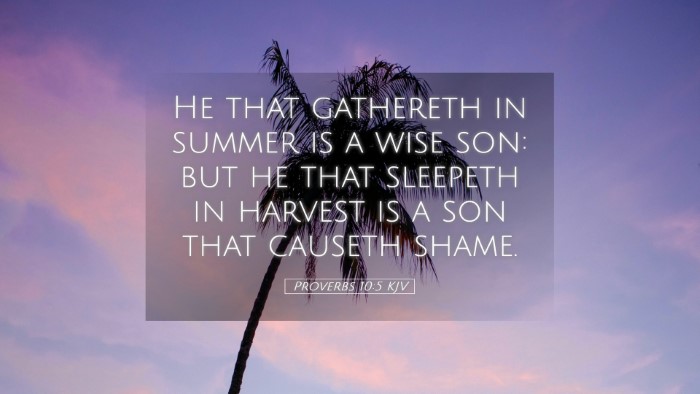Commentary on Proverbs 10:5
Verse: "He who gathers in summer is a wise son; he who sleeps in harvest is a son who causes shame."
Introduction
This verse from the Book of Proverbs emphasizes the value of diligence and preparedness. It contrasts two types of sons: the wise who work diligently in advantageous seasons and the foolish who neglect their responsibilities. This commentary integrates insights from renowned public domain biblical scholars including Matthew Henry, Albert Barnes, and Adam Clarke to provide a deeper understanding of its implications for personal character, societal roles, and spiritual life.
Contextual Background
Proverbs is a book of wisdom literature, primarily attributed to King Solomon, and it is filled with practical advice for living a life that pleases God. The verses often juxtapose wisdom and folly, righteousness and wickedness, offering a guide for moral conduct. Proverbs 10:5 fits within this framework, highlighting the importance of seizing opportunities and the consequences of inaction.
Exegesis
The Wise Son
Matthew Henry notes that the "wise son" represents those who are prudent and diligent, particularly during the season when their efforts will yield the greatest results. Gathering in summer suggests taking action during a time of plenty and preparation, which is not only indicative of foresight but also of responsibility. The summer harvest is a metaphor for opportunities that should be seized when they arise, illustrating a core principle of wisdom—being proactive in one's responsibilities.
The Lazy Son
Conversely, the "son who sleeps in harvest" signifies negligence and apathy. Adam Clarke elaborates that this laziness leads to shame, serving not only as a personal failure but also as a public disgrace. The inability to engage during critical times has far-reaching effects, dishonoring both the individual and their family, representing a failure not just in duty but also in character.
Thematic Insights
The Importance of Timing
Albert Barnes emphasizes the necessity of understanding the seasons in life. Just as summer is a season for gathering, so too are certain times in life when one must act decisively. A failure to recognize and respond to these periods can result in lost opportunities. This concept is not just applicable in the agricultural sense but extends to spiritual and personal endeavors such as ministry, education, and relationship building.
Diligence vs. Apathy
Both Matthew Henry and Adam Clarke underline the stark contrast between diligence and laziness. The verse elucidates a universal truth applicable across generations: diligence earns respect and prosperity, whereas laziness leads to shame and disgrace. This message speaks powerfully to pastors and leaders in the church, urging them to exemplify diligence in their ministries as a model for their congregations.
Spiritual Applications
This verse also carries spiritual weight. Diligently... working for the advancement of the Gospel during our 'summer'—those times when we are provided opportunities for growth and influence—is essential in the Christian walk. The call to gather is not just a physical gathering of resources but also the gathering of souls for Christ, impacting the kingdom positively.
Practical Implications
- Personal Responsibility: Each individual must assess their own work ethic and attitudes toward opportunities in life. Reflection on how one prioritizes duties can lead to personal growth.
- Leadership in Ministry: Pastors and leaders should cultivate a culture of diligence among their congregations, encouraging members to be proactive in their spiritual lives and community involvement.
- Understanding Seasons: Life has various seasons, and recognizing when to act and when to take a step back is crucial. Wisdom involves discernment in all areas of life—spiritual, personal, and communal.
Conclusion
Proverbs 10:5 serves as a powerful reminder of the virtues of diligence and wisdom contrasted against the disgrace of laziness and neglect. For pastors, students, and scholars, this verse encourages a proactive stance in the face of life's opportunities and responsibilities, fostering a mindset that honors God through faithful action and character. Reflecting on this principle calls each individual to evaluate their personal engagement with their respective callings, both in the secular and sacred contexts.


